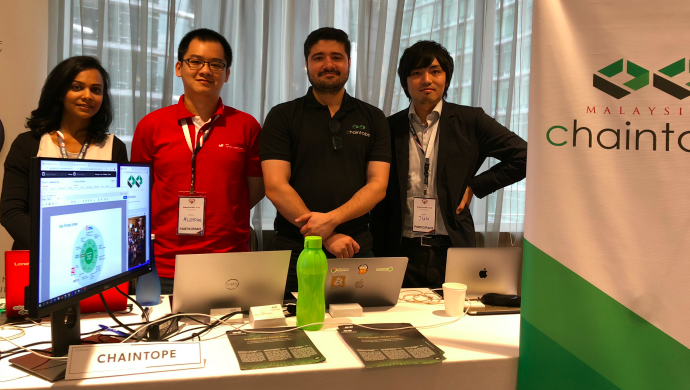Electrowise is a blockchain marketplace on which people can utilise the existing national grid to buy and sell electricity

The Chaintope team
As the world moves towards sustainability, the topic ‘eco-friendly renewable energy’ has assumed all the more importance. However, this industry doesn’t seem to be getting adequate attention from the tech sector, which could probably take this to newer heights. What is required is not just innovation in terms of hardware, but also in terms of software related to the process and supply planning from generation to consumption.
Two Japanese entrepreneurs realised this early on and have for the past few years been working on this concept. They have effectively combined new-age technology and renewable energy to drive improvement.
Hideki Shoda and Go Takahashi, through their startup Chaintope, have now come up with a blockchain marketplace on which people can utilise the existing national grid to buy and sell electricity.
Also Read: Singapore Power launches marketplace to trade renewable energy credits
“Chaintope has developed an energy platform for clients, called Electrowise,” CEO Shoda tells e27. “This platform enables renewable energy certificates (RECs) and peer-to-peer energy trading. It not only allows buyer/seller to match one another, but also traces environmental attribute (EA) to its origin to make sure the EA is genuine and produced from a renewable source.”
Started in 2016, Chaintope’s main focus is the development of blockchain-based systems for both fintech and non-fintech sectors. The firm has developed various solutions for the retail and energy sectors, as well as a concept on social capitalism.
Electrowise
Electrowise is an online exchange that combines P2P energy trading platform and renewable energy certificates, issued by a regulatory body where consumers can purchase from. Consumers and prosumers can transact energy with each other in real time from an automated system.
“The system helps both parties connect while avoiding intermediaries and saving costs. Consumers would be able to purchase electricity by selecting their providers directly from the marketplace through a bidding process. This option can also be automated by executing smart contracts for their electricity preferences,” Shoda explains.
“Prosumers, on the other hand, would be able to sell power to consumers, who benefit from lower costs. RECs can be purchased through our platform. Once these transactions are made, they are stored on the blockchain and energy is delivered via the grid. This connects consumers and prosumers while being able to utilise REC would lead to fairer prices across the board and ultimately incentivise renewable energy production in households,” he explains.
In 2017, Chaintope expanded operations to Malaysia, where it has already signed an MoU with the Malaysia Digital Economy Corporation (MDEC) and has been able to penetrate the market with the support from the government. The startup has already partnered with Malaysian electricity company Tenaga Nasional Berhad and completed the a pilot project for phase I.
Besides Electrowise, Chaintope also offers two more products — Masachain and Paradium.
Masachain and Paradium
Masachain is a concept used to visualise social capital to help build better societies. According to Shoda, it aims to handle the morally positive relationships and actions of all kinds of people using blockchain to make sure that the data is recorded accurately without forgery or falsification. The architecture is built upon the Ethereum blockchain using smart contracts.
“The idea behind Masachain involves a token economy that allows social capital to be visualised. Through the visualisation of people’s positive feelings such as ‘gratitude’, ’empathy’ and ‘support’, Masachain aims to create a new co-existing social and economic systems which possess new measures that help modern societies evaluate ‘values’ that cannot be expressed economically,” he shares.
In photos: A stroll around STATION F, one of the biggest startup campuses in the world
If implemented, claims Shoda, Masachain is effective in a wide array of communities. These communities can be people with strong feelings towards serious social issues, such as poverty and starvation; people who enjoy living in the same town or city; people who possess the same ideas and who wish to organise or plan events and solve local social issues; or people who wish to embody a corporate philosophy that aims to contribute towards society.
Paradium, on the other hand, is an end-to-end supply chain solution that can track and trace a product in the supply chain from the manufacturer right down to the end user in a streamlined process.
Future of blockchain
Talking about the future of blockchain, Shoda said that the tech still a new kid on the block and its adoption may take quite a while due to regulatory issues, education and mindset amongst the general public. “We, however, strongly believe our solutions especially in the energy (Electrowise) and supply chain (Paradium) segments will go a long way as they are able to solve existing real-world problems and also enhance the way we live,” says Shoda. “In energy, we are in line with the Malaysian government’s objectives of achieving 20 per cent renewable energy target by 2025.”
Chaintope has started exploring opportunities in other ASEAN countries, such as Thailand, Indonesia, Laos, Vietnam and Myanmar. It is talking to key industry players, such as electric power companies and universities regarding collaborative research projects.
Image Credit: Chaintope
The post With Electrowise, even an average household in Malaysia can become electricity trader appeared first on e27.